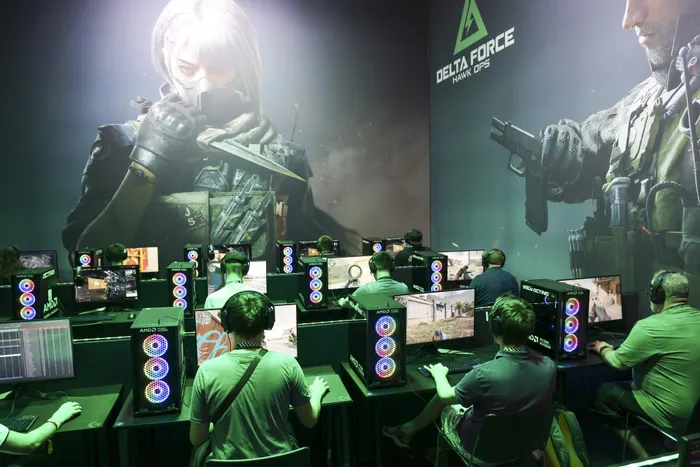
Visitors play Delta Force at the Gamescom computer gaming fair in Cologne, Germany in 2024.
Image: Alex Kraus/Bloomberg
For more than a decade, Tencent Holdings developer Leo Yao toiled in relative anonymity, churning out one shooting game after another. Then he scored one of the biggest Chinese hits of 2024 with Delta Force, a game that continues to attract 30 million players daily.
Now, Tencent’s top brass have tasked the 43-year-old with helping orchestrate a major shift at China’s most valuable company. Executives see a change in tastes among domestic gamers - long deemed a smartphone-dominant audience - toward embracing PCs and shooters. That’s prompted a push to invest more in shooting titles, traditionally dominated by Western players, which research house Newzoo estimates are worth roughly 9% of the $189 billion global games arena.
Armed with the experience of converting Call of Duty’s fast-paced PC action to a touchscreen-friendly mobile hit, Yao and his team at J3 studio combined several genres and play styles with Delta Force, which proved instantly popular in China. Cracking the overseas market is now the top priority.
“The senior leaders will ask questions like, ‘Do you need a bigger budget for marketing’” and user acquisition abroad, Yao said matter-of-factly in a rare interview from his studio in Shenzhen. “In our foreign markets, we’re seeing gradual progress.”
Breaking through in the hotly competitive shooting genre is a daunting task, but confidence is high within Tencent. Yao’s J3 team is seen as a safe bet after Delta Force outperformed internal forecasts, and the upside of high expectations is that Yao has the “complete trust” of senior management, he said.
The underlying ambition is for Tencent to build rather than buy the foundation of its future success. Shooting games figure prominently in the Chinese entertainment giant’s portfolio of winning investments, including stakes in the makers of Fortnite, PUBG and Far Cry. But the company lacks the gravitas of being a true creative force, with most gamers seeing it as a partner or publisher rather than maker.
Yao and his specialist team are now working to build up the credentials that would draw people in to Tencent games because they’re made by Tencent, hoping to emulate the success of Half-Life creator Valve Corp.
The push for greater self-sufficiency at the same time as pursuing more overseas opportunities is also characteristic of a newly reinvigorated Chinese tech sector. The export of everything from large language models for AI to drone deliveries and gig-economy platforms is flourishing as companies from Alibaba Group Holding Ltd. to Meituan pursue growth aggressively again. Tencent is already dominant among Chinese gamers, with seven of the top 10 highest-grossing mobile games in the country. It now wants to get the rest of the world hooked.
Yao, who had a two-year stint at US publisher Electronic Arts before joining Tencent, recognizes the road ahead will be long. But his ambition is spelled out on the walls of J3’s newly renovated offices, with a slogan written out in both English and Chinese: “Dominating Global Shooter Gaming.”
“Right now, our team is essentially 99% Chinese. What we understand best is Chinese culture, Chinese context and the Chinese environment,” Yao said. “It’s genuinely difficult for us to know what overseas players are thinking or how they would perceive this game.”
The company is making all resources available for J3’s future ventures, and to rectify gaps in its knowledge, the studio is hiring new staff to focus exclusively on overseas markets. It’s also talking to influencers for feedback, in a move Yao describes as a return to Tencent’s tried-and-true method of listening to users to truly understand what they want.
When J3 began development of Delta Force, Yao decided to build the foundation in what was then a nascent genre – an extraction shooter – wherein players succeed by escaping from a map with their loot in hand. But his team also threw in a large-scale multiplayer battleground and a story-driven campaign, resulting in three highly distinct modes.
The marketing team embraced this Frankenstein-like identity, striking a promotional deal with a brand of eight-treasure congee, a traditional porridge famous for combining a wide variety of ingredients. Yao and the company will need to develop similarly localized promotional strategies the further afield they go.
Creating original hit games – content that can stand on its own – hasn’t been Tencent’s traditional strong suit. The company has long fought a reputation as a copycat, a perception reinforced by controversies including a July lawsuit from Sony Group that the Chinese firm disputes.
Yao didn’t address that ongoing case, though he rejected the idea that Tencent games may seem derivative. “The design of all first-person shooter games is built on universal principles,” he said about Delta Force blending multiple established game formats. “We’re quite open-minded about this issue.”
Building a team capable of distilling a distinct Tencent aesthetic and crafting compelling single-player narratives will be a long process, Yao admits. But there’s a unified vision inside Tencent and “everyone is shoring up their weak spots,” he said.
BLOOMBERG